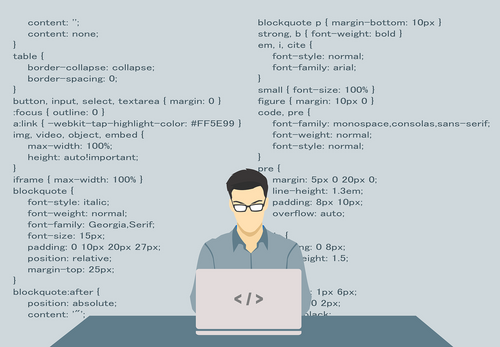Recruitment in IT
IT industry is one of the fastest-changing businesses. It is definitely an industry for people who cannot stand boredom and are keen on taking new challenges. Continuous learning is the number one rule in this sector. This does not only apply to software developers and testers but also to recruiters. In order to stay ahead of the competition, it is necessary to follow new trends and constantly make changes.
A specific situation on the market, where the demand for employees still exceeds the supply, makes recruitment in the IT industry especially difficult. Talented software engineers are not willing to leave their jobs today. Although, employees may not be satisfied with their current employer, decision to change jobs is not as easy as it used to be. It does not come as a surprise that a rising number of employers have significant difficulties acquiring new professionals and filling in vacancies. It also creates more and more challenges for every IT recruitment agency to find experienced software engineers.
Effective IT recruitment is an uphill battle, therefore, successful hiring managers should meet several basic requirements to be able to collect requirements from the employer effectively, apply various recruitment solutions, have excellent communication skills and establish good rapport with people easily. It is especially important nowadays as increasing numbers of companies turn to IT recruiter agencies and recruitment consultants to help them find tech professionals.
Why Are Talented Developers So Hard to Find?
 The scarcity of developers has become a pervasive challenge across industries, stemming from a perfect storm of factors. One of the primary reasons is the rapidly evolving landscape of technology. With new programming languages, frameworks, and tools constantly emerging, companies find themselves in a constant battle to secure developers who possess the specific skills needed for their projects. This dynamic leads to a situation where demand consistently outpaces the supply of qualified individuals, creating a shortage that has proven difficult to alleviate.
The scarcity of developers has become a pervasive challenge across industries, stemming from a perfect storm of factors. One of the primary reasons is the rapidly evolving landscape of technology. With new programming languages, frameworks, and tools constantly emerging, companies find themselves in a constant battle to secure developers who possess the specific skills needed for their projects. This dynamic leads to a situation where demand consistently outpaces the supply of qualified individuals, creating a shortage that has proven difficult to alleviate.
Furthermore, the intricate nature of software development demands a level of expertise that takes time to cultivate. While there are various educational paths, from formal computer science degrees to intensive coding boot camps, mastering the art of programming requires dedication and practice. Given the complexity of modern applications and the diversity of specializations within the field, developers need to continuously update their skills to remain relevant. This ever-present need for upskilling, combined with the rapid pace of technological advancement, perpetuates the scarcity issue as companies seek developers who are not only well-versed but also adaptable to change.
The competitive landscape for developer talent has also played a substantial role in their scarcity. Leading technology companies, startups, and other industries all vie for the same pool of skilled professionals. This has sparked salary inflation as companies offer increasingly attractive compensation packages to secure top talent. Smaller businesses, in particular, find it challenging to compete with these compensation packages, often leading to difficulties in filling essential technical roles. The result is a talent market where experienced developers are in high demand and can often pick and choose from a range of promising opportunities, further intensifying the scarcity issue.
Values That Count for the Candidates
At the beginning of the recruitment process, we should consider what is important for employees today. Statistics show that a salary is not what attracts employees the most. A good pay in the IT industry is a standard and essentially the candidates want to know whether the project we offer will guarantee their development. Without this your employee might soon sense an ample opportunity elsewhere.
Secondly, there is a question about the possibility of remote work and the office location. The COVID19 pandemic has significantly changed the attitude of employees in this matter. Some of the employees now prefer working remotely. Our experience shows, however, that the vast majority prefer hybrid work or the possibility of working onsite.
In the end, employees want to know about the benefits. A quite common question is the form of employment among which are B2B, permanent or contract employment.
Additionally, candidates inquire about the need to have a team management competence which often contributes to the rejection of the offer and results in losing valuable professionals.
What Do You Need to Do Before You Start Your Recruitment Process?
Before you start recruiting software engineers, it is essential to lay a strong foundation. Proper preparation will help ensure that your efforts are targeted, efficient, and yield the best possible results. Here is what you need to do before you begin the recruitment process:
Define the Role and Requirements
Clearly outline the job role and responsibilities of the software developer position you are hiring for. Determine the technical skills, experience level, education, and any specific qualifications needed for the role.
Set Clear Goals and Objectives
Define what success looks like for this recruitment process. Set goals for the number of candidates to be interviewed, the time frame for hiring, and the quality of candidates you are aiming to attract.
Create a Compelling Job Description
Craft a detailed and appealing job description that accurately describes the role, responsibilities, required skills, and the company culture. Use language that resonates with potential candidates and conveys your company's unique value proposition. Think about the platforms where you can post your job openings.
Establish a Recruitment Budget
Determine how much you're willing to invest in the recruitment process. This budget can cover job posting fees, advertising, recruiting tools, and any expenses related to interviews or assessments.
Design the Interview Process
Plan the interview stages, including technical assessments, coding challenges, behavioral interviews, and cultural fit assessments. Define the evaluation criteria for each stage to ensure a structured and consistent process.
Assemble the Interview Team
Identify the team members who will be involved in the interview process. This might include technical leads, team members, HR representatives, and possibly even senior leadership.
Create Evaluation Rubrics
Develop detailed evaluation rubrics for technical and behavioral assessments. These guidelines will help interviewers objectively evaluate candidates based on predefined criteria.
Choose Recruitment Tools
Consider using applicant tracking systems (ATS), coding assessment platforms, and other recruitment tools to streamline the process, manage applications, and track candidate progress.
Prepare for the Candidate Experience
Develop a strategy for providing a positive candidate experience. This includes timely communication, transparency about the recruitment process, and providing feedback to candidates, regardless of the outcome.
Build a Strong Employer Brand
Enhance your company's online presence, showcase your company culture, and highlight employee testimonials to create a strong employer brand that attracts top talent.
Prepare for Onboarding
Anticipate the onboarding process for the selected candidate. Plan their integration into the team, provide necessary resources, and schedule any training sessions.
Taking these steps before launching your recruitment process will help you approach it with confidence, consistency, and a clear plan. This will ultimately improve your chances of attracting and hiring the right software developers for your team.
What to Look for When Hiring Software Developers
Whether you need to recruit junior developers or experienced tech engineers, it is crucial to focus on a well-balanced set of qualities and skills that align with your company's needs and the demands of the role. Technical proficiency stands as a cornerstone of evaluation, encompassing a candidate's mastery of programming languages, frameworks, and tools relevant to the job. A solid grasp of algorithms, data structures, and problem-solving capabilities showcases their ability to architect efficient and scalable solutions. Beyond technical prowess, seek candidates who demonstrate adaptability and a willingness to learn. The technology landscape evolves rapidly, making it imperative to select developers who can seamlessly embrace new languages and paradigms, ensuring their contributions remain cutting-edge and effective.
Effective communication and collaboration skills are equally essential. A developer's ability to articulate ideas, collaborate with cross-functional teams, and translate technical concepts to non-technical stakeholders contributes to the seamless flow of information within the organization. Furthermore, a developer's coding quality is a window into their attention to detail and commitment to maintainable, error-free code. By reviewing portfolios and past projects, you can gauge their real-world experience and creative problem-solving abilities. The alignment of a developer's values, work style, and personality with your company's culture is a pivotal aspect often overlooked. A harmonious cultural fit ensures not only smoother teamwork but also greater engagement and longevity within the organization.
In addition to technical skills, it's crucial to assess a candidate's attitude and mindset. Look for candidates who exhibit a passion for technology and a genuine interest in pushing the boundaries of their skills. Developers who possess a continuous learning mindset and remain up-to-date with industry trends show a commitment to professional growth. An understanding of the specific problem domain is advantageous as it allows developers to create solutions that resonate with end-users. Resilience in the face of challenges and an ethical approach to decision-making underline a candidate's character and their ability to navigate complex scenarios with integrity. By adopting a holistic approach that considers technical acumen, communication skills, cultural alignment, and a growth-oriented mindset, you can ensure that the software developers you hire will contribute effectively to your team's success.
Effective Hiring Process and HR Department
If a company has their own recruitment department, they have to remember about continuous employee training. A good recruiter must also have certain personality traits which enable good and effective work and attract new candidates.
- Technology and Technical Knowledge
A recruiter does not need to have broad technical knowledge. It is vital that they know the basics, can distinguish the differences between individual programming languages and understand what the work of the recruited specialist will involve. A first-class headhunter should regularly participate in meetings and conferences addressed to programmers. Thanks to this, it is easier to understand which aspects of their job offer may encourage or scare away the potential candidates.
- Effective Data Collection
The main and the most important task of the recruiter is to understand the expectations of both the recruited candidate and the IT manager. A well-prepared conversation is essential. Creating a list of questions for the IT manager and the candidate will help us a lot in organizing the interview. It is important to take notes. Memory can be fleeting and asking for the same things several times may negatively impact the perception of our person.
- Building an Offer
It is another key point that must be well-thought-out before we start interviewing the candidates. Each headhunter wonders what can attract candidates to their offer. Competitive pay does not always turn out to be the most important factor. The level of interest in the project, the office location or a wide range of attractive benefits may be equally important. It is crucial to find at least one thing that will encourage candidates to talk to us. Fruit Thursdays, private medical care and gym membership cards have become a standard. Flexible working hours or the possibility of remote work are also prevalent and not very original ideas. Be creative. Create an offer which stands out. Additionally paid vacation? Possibility to come to work with a dog? Interesting trips for the employees' families? These are simple ideas that do not cost a fortune and may prove to be a great incentive for a potential employee.
- Recruiter's Personality Traits
When building a recruitment department in a company, it is fundamental to remember that in this profession soft skills are as important as technical knowledge. An effective recruiter should be a sociable person who quickly establishes contact with other people. They should also be able to present the requirements substantively and skillfully recognize the candidate's personality traits during the interview. The ability to handle unexpected situations and a high level of personal culture are also of great importance. The high demands of IT services resulted in many employers started looking for recruitment agencies specializing solely in IT industry employment. There are several practical and economical solutions that can significantly facilitate and shorten the search for employees. Below are some ideas on how to deal with the IT industry recruitment:
Recruiter Paid Per Hour
If you do not have your own recruitment department, you can use recruitment service by hiring a recruiter who is paid hourly. Rising number of freelancers prefer this solution. Obviously, it has its both: upsides and downsides. An undoubted advantage is the cost reduction as building your own recruitment department generates substantial costs.
Outsourcing recruitment agencies are highly motivated to find an employee for us as fast as possible. In addition, recruiters often have an extensive database of candidates as well as co-operate with a group of skilled professionals from which they can choose the most suitable specialist who will meet the company requirements. However, it is important to review the recruitment agency before kicking off the collaboration. The drawback of this solution is the fact that the motivation to finalize the contract may turn out to be so strong that the recruiter may not present the employer's expectations to the candidate clearly enough. Moreover, some information might be omitted in the negotiations in order to finalize the contract quickly. However, such a faulty approach to recruitment will not work in the long run. Provided that an employee does not receive precise information about their position, they might get disappointed and quit the job, leaving the company with the need to start recruitment from scratch.
HR and Recruitment Agency
This is a solution that, as in the case of a hourly paid recruiter, has several advantages as well as disadvantages. Agencies often assure that their employees have the appropriate level of technical knowledge. However, if you want to be sure that the prospective candidate fits your project, you can organize such an interview using your employees who will check their abilities. Remember that it is advisable to check soft skills. This solution is cheaper than hiring a permanent employee. Thanks to it, a company can save a lot of time and money. Unfortunately, the costs of using recruitment agencies have increased recently. What is more, the increase in prices is not always accompanied by an increase in quality. Sadly, there are still companies on the market whose goal is to finalize the contract at all costs, which causes a lot of problems for the future employers. Recruiters sometimes make unattainable promises which leads to an employee being disappointed once they get disillusioned about their job.
Employee Outsourcing
It is a solution that involves finding a professional company that specializes strictly in IT recruitment as well as in hiring and "renting" employees. It is a great option for companies which do not want to form an in-house software team for a small project or extensive and complex recruitment for long-term projects. In addition, outsourcing ensures that we do not have to deal with all issues related to employment, providing benefits, managing HR and payroll matters.
The employment process is conducted by an external company and we only utilize their knowledge and work. This solution is a convenient option that is recognized by more and more companies. One does not need to worry about whether the recruitment process is going well as it is in the best interest of the partnering company to employ the candidate who will be the best match.
External software developer recruiters should check soft skills so that the recruited candidate fits the existing team. If we are looking for a team for a new project, it is vital to point out to the recruitment company that the team needs to be properly checked in terms of character traits. Remember that building a team consisting mainly of strong characters does not bode well for success. We must also indicate the required extent of the level of communication development. If the team's communication with a client is frequent, it is worth recruiting people who can establish contacts easily and have good communication skills.
Are you looking for software developers? Contact us and we will find the best engineers for you!
Is Technical Interview Important?
Technical interviews are incredibly important, especially when you recruit software developers. They serve as a crucial tool for assessing a candidate's practical skills, problem-solving abilities, and technical knowledge. Here are some reasons why technical interviews are essential:
Assess Technical Competence
Technical interviews provide a hands-on assessment of a candidate's ability to apply their knowledge and skills to real-world coding challenges. This helps you gauge their proficiency in programming languages, algorithms, data structures, and problem-solving.
Verify Skill Claims
Resumes and CVs can sometimes exaggerate a candidate's skills or experiences. A technical interview allows you to validate the candidate's claims and ensure they have the skills they've listed.
Identify Problem-Solving Abilities
Software development involves solving complex problems efficiently. Technical interviews assess a candidate's problem-solving approach, creativity, and analytical thinking, which are critical for success in the role.
Evaluate Coding Style and Quality
Through technical interviews, you can evaluate a candidate's coding style, code organization, readability, and adherence to best practices. This is important for maintaining code quality and consistency within your team.
Determine Adaptability
Technical interviews often involve unfamiliar scenarios or new technologies. Technical recruiter checks how candidates approach these challenges can demonstrate their ability to learn quickly and adapt to new environments.
Test Communication Skills
Technical interviews assess a candidate's ability to explain their thought process and code choices. This mirrors real-world interactions with teammates and stakeholders and showcases communication skills.
Differentiate Candidates
Technical interviews help you distinguish between candidates with varying levels of expertise. This differentiation is important when making hiring decisions and forming a well-rounded team.
Predict Job Performance
While not foolproof, technical interviews can provide insight into how a candidate might perform on the job. Candidates who excel in technical interviews often show strong potential to contribute effectively to your projects.
Cultural Fit Assessment
Technical interviews can also include elements that assess how well a candidate aligns with your team's work style, values, and company culture.
Build Confidence in Hiring Decision
Rigorous technical interviews increase your confidence that the candidate you're hiring has the technical skills needed to excel in the role, reducing the risk of poor hires.
It's important to note that while technical interviews are valuable, they should be just one part of a holistic recruitment process. Pair them with behavioral interviews, cultural fit assessments, and other evaluation methods to gain a comprehensive understanding of each candidate. Additionally, it's crucial to design technical interviews that closely reflect the actual challenges and tasks the candidate would face in the role to ensure the assessment is relevant and accurate.
Why Should You Hire Vratislavia Software?
We are a team of software developers who outsource their services and employees to various businesses. We also offer a body leasing which can be especially beneficial for a company which requires IT employees for a short-term project.
What Is a Staff Augmentation?
Staff Augmentation is an employee outsourcing where a customer rents an IT specialist from a company which specializes in this kind of practice for as long as they need them. Customer decides whether they want to hire the software engineer for a full-time or part-time.
What are the Benefits of Staff Augmentation for Your Company?
There are several upsides of staff leasing where the most important are:
- Costs minimization - you do not need to run a time-consuming and expensive recruitment as an outsourcing company will do it for you;
- You will receive the most suitable specialists for your project, for as long as you need them;
- You can forget about dealing with HR and payroll duties - we will do it for you;
- You can hire one employee or an entire team. While recruiting a team we not only take into account technical knowledge but also soft skills. A good team is like a well-oiled machine, where people are willing to co-operate and work efficiently.
From Start to Success: Concluding Thoughts on Recruiting Software Developers
In the ever-evolving landscape of technology, recruiting top-tier software developers has become a strategic imperative for businesses seeking to innovate and thrive. The journey to unearth exceptional tech talent is a multifaceted endeavor that requires a combination of well-crafted strategies and a keen understanding of industry trends. This article delved into a spectrum of effective strategies that can propel your tech talent hunt to success.
From cultivating a compelling employer brand that resonates with developers' aspirations, to leveraging online platforms and social media for maximum visibility, the recruitment process starts with a strong foundation. The heart of the endeavor lies in technical interviews, where candidates' problem-solving abilities, coding proficiency, and adaptability are put to the test. This phase provides a crucial bridge between theoretical knowledge and practical application, ensuring that the selected developers possess the skills necessary to drive your projects forward.
Yet, the process is not merely a checkbox exercise; it is a holistic exploration. Cultural fit assessments, communication prowess, and passion for technology all weave into the fabric of a truly remarkable developer. By fostering an environment that encourages collaboration and celebrates continuous learning, you're more likely to attract those who thrive in dynamic and forward-thinking workplaces. The insights shared within this article provide a roadmap to navigate the intricacies of tech talent acquisition. As you embark on this journey, remember that the developers you bring on board are not just employees—they are the architects of your digital future. With these strategies as your guide, you're better equipped to identify, engage, and secure the software developers who will drive innovation, elevate your projects, and contribute to the growth of your organization.
Last updated: Wed, September 06, 2023
Are you interested in renting an IT specialist for short or long-term project, for part or full-time? Get in touch and schedule a free consultation.



